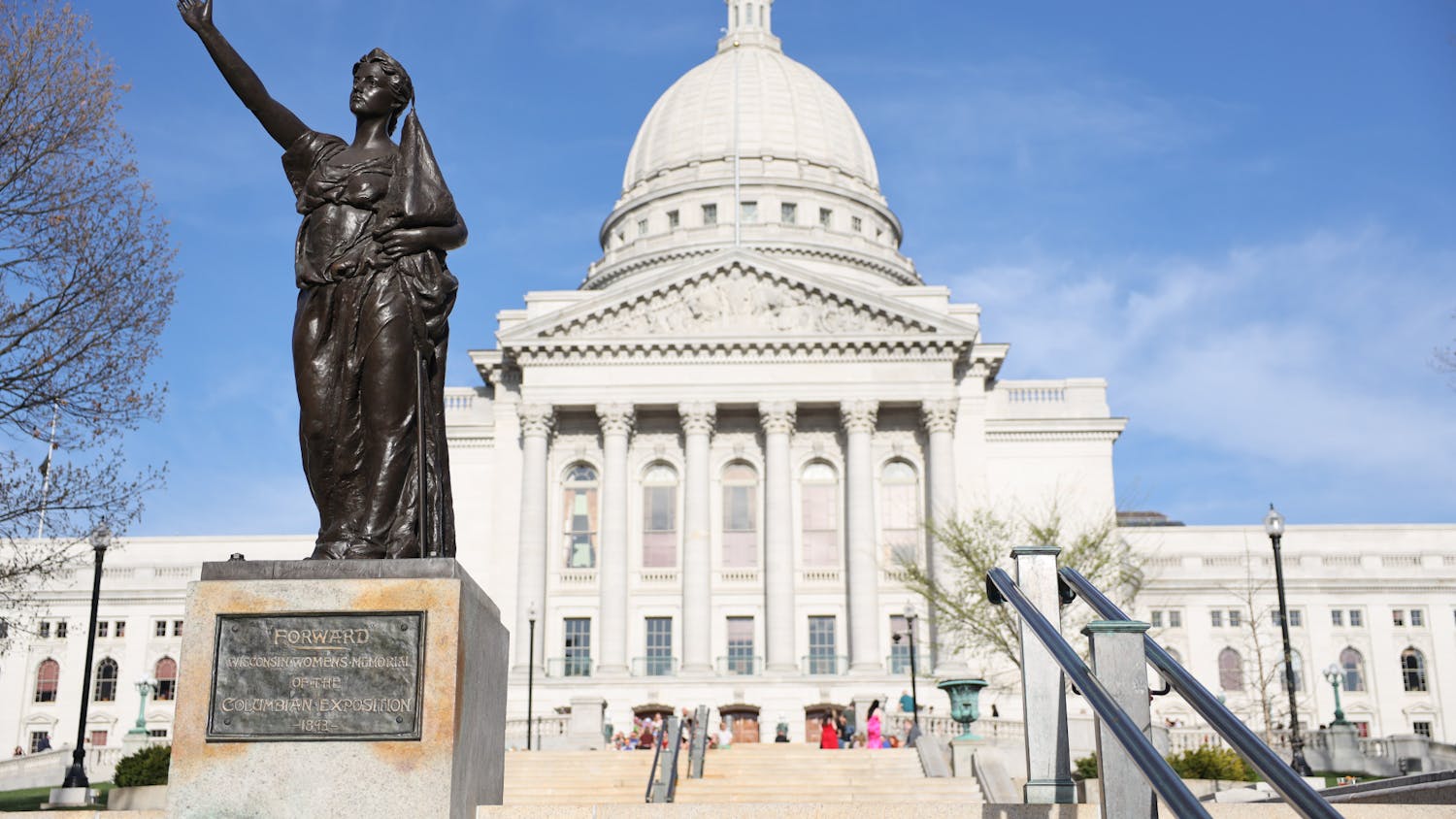Pro-Palestine encampment protests at University of Wisconsin-Madison are well into a fourth day despite an attempt from police to quell the demonstration with force and arrests Wednesday morning.
Here are your questions about the protest, answered.
For live updates, tune into The Daily Cardinal’s day four blog here.
When did the protest start?
The protest began at 9 a.m. Monday on Library Mall. Protesters began setting up tents shortly after.
How many people are participating?
A total of 37 tents were pitched on Library Mall early Wednesday before police forcibly confiscated most tents between 7:30 a.m. and 9 a.m.
Although protest attendance has waxed and waned since Monday, it peaked at roughly 300 protesters during active times, often in the morning or early evening.
There were 28 tents on Library Mall as of 5:30 a.m. Thursday morning.
More: No police action until pro-Palestine protesters meet with Mnookin again
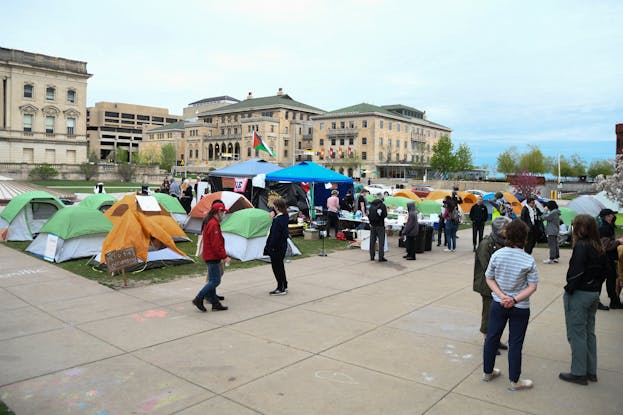
What are protesters’ demands?
Protesters continue to advocate for a list of six demands, including investment transparency and divestment from all companies the American Friends Service Committee said participate in the border, surveillance, prison and occupation industries.
Other demands are cutting ties with “Israeli institutions,” including a graduate exchange program and study abroad trips to Israel, getting “all cops off campus” and a call to “stop the land grabs and cease expansion, in order to house our community.”
University officials refused to read the demands in an initial meeting, protesters said Monday.
The university has since held further negotiations with a small group of protesters to discuss demands. Following a Thursday morning meeting with administrators, demonstrators said there would be no further police action against the encampment until their next meeting with Mnookin.
The meeting is expected to take place within 24 hours. The university has confirmed it is negotiating but has not agreed to any demands.
More: A review of UW System’s investments amid demands for divestment
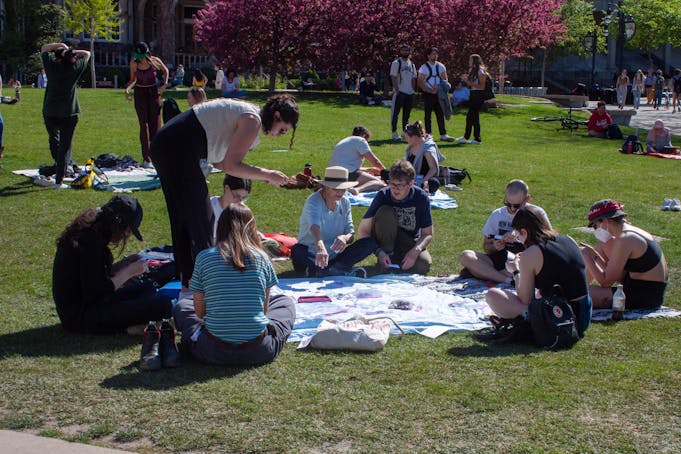
Have the protests been peaceful?
Yes, with a brief exception Wednesday morning as police raided the camp and confiscated camping supplies, including tents.
Police were the first to use force, and protesters resisted using human chains. Multiple protesters pushed into police riot shields as the raid unfolded.
Police showed up to the peaceful protest with riot gear including batons, shields, zip-tie handcuffs, gas masks and large weapons.
More: Protesters rebuild encampment after police remove tents
Did people get arrested?
Yes. A total of 34 people were arrested Wednesday, and four protesters were booked into the Dane County Jail, said Marc Lovicott, UW-Madison Police Department spokesperson.
UWPD later released the names of the four protesters booked into the Dane County Jail. The list, published Wednesday afternoon, included a UW-Madison student who was charged with battery to a police officer and resisting arrest.
A majority of those arrested were released with no citation.
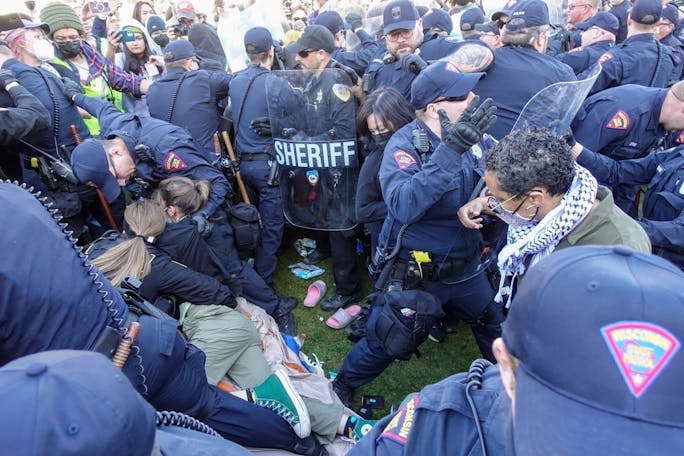
Was anyone injured?
Yes, though there’s no official count of injuries.
At least two UW-Madison professors, Sami Schalk and Samer Alatout, reported injuries.
Schalk, a gender & women’s studies professor, said in a tweet Wednesday she visited the hospital to treat injuries sustained during the police crackdown.
Schalk said she was “significantly bruised, in a lot of pain” and had sprained her shoulder. A video also showed officers strangling her.
Alatout was photographed with a bleeding cut on his forehead while being detained. It’s unclear how he sustained the cut, but videos showed police pushing Alatout to the ground, after which he pushed back on riot shieds.
At least three student journalists, including two reporting for The Daily Cardinal, reported scrapes and bruises after being pushed by police with riot shields and batons.
Four police officers were injured due to “physical resistance from protesters,” Lovicott told the Cardinal in an email Wednesday.
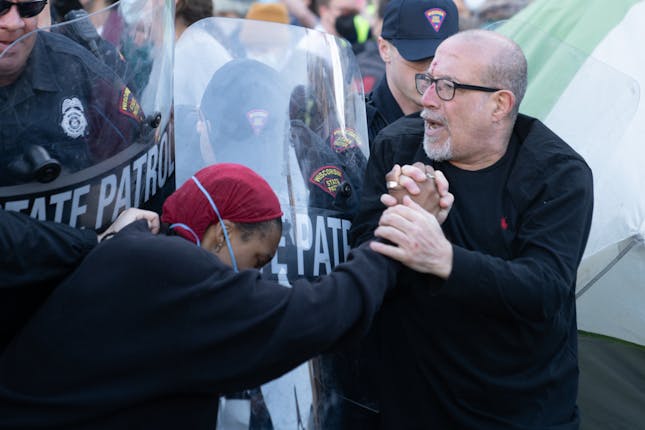
Have there been counterprotests?
Yes, and they were peaceful.
Individuals and small groups of students voiced intermittent support for Israel throughout the first three days of protests, with some raising signs and waving flags with messages supporting Israel, opposing antisemitism or condemning Hamas, the militant governing group in Gaza.
Protesters so far have opposed the war in Gaza and harshly condemned Israel. But calling the protest "pro-Hamas" on the whole, as some onlookers have, is not accurate.
The largest counterprotest occurred Wednesday evening, when a group of roughly 60 students arrived at Library Mall with Israeli flags and a speaker. The group departed Wednesday night.
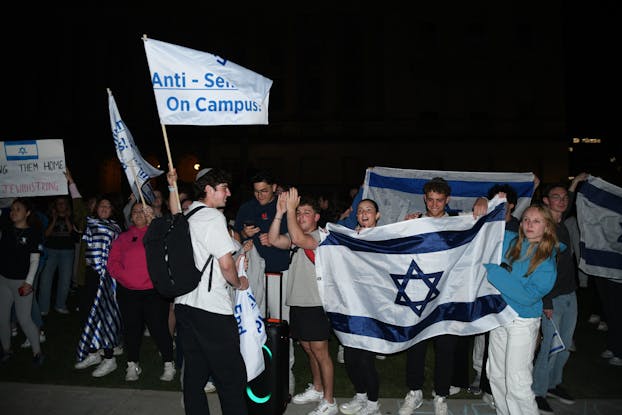
Were all tents removed during the police raid Wednesday?
No. At least one tent remained up through Wednesday’s police raid, and a second was spotted minutes after.
Despite this, both Lovicott and UW-Madison Chancellor Jennifer Mnookin made inaccurate statements Wednesday morning that the encampment tents had been cleared and the protest was in compliance with state law.
Lovicott corrected himself after a question from reporters, and the university acknowledged the tents in an update Wednesday evening.
"We're working on that. I'm not sure what our plan is,” Lovicott said Wednesday morning. “But we were able to remove, obviously, the vast majority of the tenting equipment."
UWPD officers will observe the encampment in the interest of public safety, the university said in the Wednesday evening update.
What have university leaders said about the protest?
Not much over the past four days, with the exception of the occasional statement from Mnookin and a brief press conference with UW-Madison and UWPD representatives Wednesday morning.
Mnookin throughout the protests has maintained the university’s aim is to allow free expression while enforcing Chapter 18 of the Wisconsin Administrative Code, which prohibits camping on public university grounds.
Mnookin condemned both Islamophobia and antisemitism in her statement.
“We recognize and respect that protest is part of our community’s precious right to free speech and expression,” she said in a statement Wednesday. “But such rights are not unlimited.”
Cardinal reporters who have tried to speak with other university leaders during protests were handed business cards for Kelly Tyrrell, a UW-Madison spokesperson.
UW System President Jay Rothman weighed in after Wednesday’s police crackdown to praise Mnookin for what he said in a statement was “her reasonableness and resolve, as well as her commitment to free expression and the safety and security of her students.'”
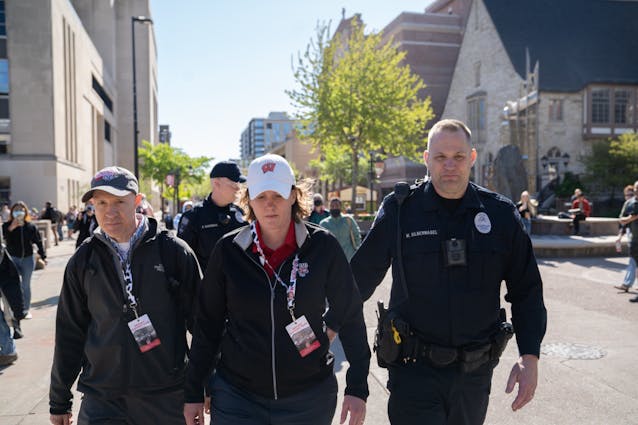
Can the chancellor authorize encampments?
The chancellor does have the power under Chapter 18 to make exceptions to the camping ban.
University spokespeople have refused to answer repeated questions about how administration interprets this law.
Mnookin told the Cardinal last Friday she will not make an exception to Chapter 18.
More: UW-Madison chancellor does not plan to authorize encampments on university grounds
Have there been “outside agitators?”
A few, yes, though their presence hasn’t overshadowed the main peaceful protest.
On Tuesday, an individual displayed the “Heil Hitler” salute to a group of Jewish students. He was not part of the pro-Palestine protest despite claims otherwise from some professional media outlets, Wisconsin Watch reported in a fact check Wednesday.
The individual admitted to using the salute in a video obtained by the Cardinal. UWPD is investigating the incident.
Mnookin on Wednesday cited “disturbing accounts of people not affiliated with the campus coming into the area, attracted by the encampment, and engaging in confrontational and other inciteful behaviors,” as one of the reasons leaders chose to break up the encampment.
She said a “small number of blatantly antisemitic actions” were reported but that there was “no evidence” UW-Madison community members engaged in this activity.
The university is investigating bias reports involving individuals from outside of the campus community, Mnookin added.
More: UWPD investigating antisemitic incident on Library Mall
What have local, state lawmakers said?
Madison District 8 Ald. MGR Govindarajan and state Rep. Francesca Hong, D-Madison, both of whom represent parts of the UW-Madison campus, condemned police use of force in statements Wednesday.
Govindarajan and two other local lawmakers were shoved Monday night at the Fluno Center, as recorded in a widely circulated video filmed by a Cardinal reporter.
“I am disappointed and appalled to see the unnecessary use of force, by police,” Govindarajan said in a statement posted to Instagram. “The chilling effect from today’s actions will leave a stain on UW’s legacy.”
Multiple Republican state lawmakers have taken a harsh stance against the protests, calling on UW-Madison to crack down on encampments and protect the safety of Jewish students.
Assembly Speaker Robin Vos, R-Rochester, called the police crackdown a “good move” in a tweet Wednesday.
“Thank you @uwchancellor for doing the right thing by enforcing campus policies and standing up to the unruly mob,” Vos wrote.
Democratic Gov. Tony Evers ruled out the possibility of the Wisconsin National Guard intervening in a statement to reporters Tuesday.
He said the protest at UW-Madison and a similar demonstration at UW-Milwaukee were "fine” but urged protesters to avoid breaking laws or policies.
“At some point in time, the encampments have to end, whether that’s done voluntarily or not," Evers said.
Will the protest end anytime soon?
No, at least for the short term.
Protesters announced Thursday morning there would be no further police action against the encampment until their next meeting with Mnookin, which is slated for sometime within 24 hours after Thursday at 11 a.m.
This comes after university officials previously said they would not talk with protesters until tents came down.
This article was updated at 8:09 p.m. on Thursday, May 2.
Tyler Katzenberger is the former managing editor at The Daily Cardinal. He also served as the state news editor, covering numerous protests, elections, healthcare, business and in-depth stories. He previously interned with The Capital Times, Milwaukee Journal Sentinel and is an incoming POLITICO California intern. Follow him on Twitter at @TylerKatzen.


